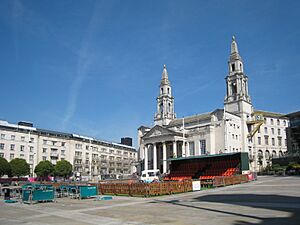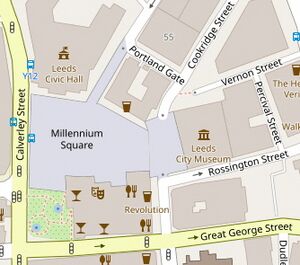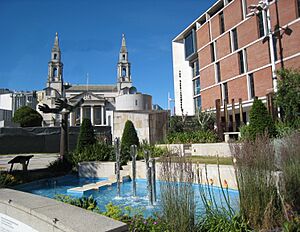Millennium Square, Leeds facts for kids
Millennium Square is a cool city square in the Civic Quarter of Leeds, West Yorkshire, England. It was a big project for Leeds to celebrate the year 2000. Both Leeds City Council and the Millennium Commission helped pay for it. The whole project cost about £12 million.
Contents
What is Millennium Square Like?
Millennium Square is a large L-shaped area where people can walk and hold events. It slopes down from Leeds Civic Hall. On one side is Calverley Street, and across the street is the Brotherton Wing of Leeds General Infirmary.
The square has three main parts:
- A big open area for events.
- A smaller area with seats and plants.
- A southern part with gardens and water features.
The main event area is shaped like a rectangle. It's paved with York stone and has granite lines. The Civic Hall borders part of this area. A pub and restaurant called Cuthbert Brodrick is also nearby. The area with seats and plants is next to the Leeds City Museum.
The southern part of the square is called the Mandela Gardens. It's named after Nelson Mandela. Next to these gardens is the new Carriageworks Theatre. The front of this theatre is white, so it can be used as a giant screen for projections. There's also a large TV screen and a stage that can be set up for shows. All the power, dressing rooms, and toilets for the stage are hidden underground. A control tower for events is in the northeast part of the square. It's hidden inside a sculpture called "Off Kilter," which looks a bit like a grenade!
To the east of the Carriageworks Theatre are older buildings. One is the Electric Press, a former printing factory from 1900. It's a listed building because it's historically important. This building and others nearby now have bars, restaurants, and a film school for Leeds Beckett University. These businesses helped pay for the square.
On the southeast side of the square is another old printing factory, the Leonardo Building. It's also a listed building. It was updated in 1998, just as work on Millennium Square began. In 2022, a fire damaged the Leonardo Building.
Mandela Gardens: A Special Place
The gardens in front of the Civic Hall were first named after Nelson Mandela in 1983. But the gardens you see today were built as part of the Millennium Square project. Nelson Mandela himself came to Leeds in 2001 to officially open them again.
There's a bronze sculpture here called "Both Arms" by Leeds artist Kenneth Armitage. It's meant to show people coming together.
The garden was redesigned and won an award at the 2004 Chelsea Flower Show. This new design was put in Leeds in 2006. It also celebrates the friendship between Leeds and Durban, South Africa. You can see a bronze plaque with handprints from the mayors of both cities. There's also a "Freedom Path" with footprints of children from Leeds and Durban.
The gardens have two flower beds: one with plants from South Africa and one with British plants. A path and a water feature connect them. The water feature is made of Portland stone and looks like the bars of Mandela's prison.
How Millennium Square Was Built
When the Civic Hall was built in 1933, there were gardens and a car park nearby. In the 1960s, some old houses were knocked down. This created more space that the city council owned.
Leeds City Council decided to turn these areas into a new public square. It was the first new public square in Leeds in 60 years! They wanted a big open space for events. It needed to hold up to 5,000 people. It also needed a quiet garden area with places to sit. The budget for this big project was £12 million.
Work started in 1997. Streets in front of the Civic Hall were closed and paved over. The first part of the square was finished in December 2000, just in time for the Millennium celebrations. The whole project was done by April 2001, costing £12.5 million. The main architect was John Thorp.
More buildings around the square were developed until 2008. This included turning the Leeds Institute building into the Leeds City Museum.
In 2002, work began on the Electric Press printworks. Then, in 2003, a new theatre was built next door. This became the Carriageworks Theatre. Some people didn't like the theatre's cube shape at first. But it later won awards for its design and lighting. From 2005 to 2008, the Leeds Institute was changed into the Leeds City Museum.
Fun Things to Do at Millennium Square
Millennium Square is a busy place! It hosts many events, like:
- City ceremonies
- Fairs and markets
- Big events shown on the TV screen
- Concerts by bands like Kaiser Chiefs, The Cribs, Meat Loaf, Embrace, Simple Minds, Ocean Colour Scene, and The Bluetones.
On April 30, 2001, Nelson Mandela, the former President of South Africa, visited the square. He opened the Mandela Gardens and was given the "Freedom of the City." He famously joked that he was happy to be in Liverpool instead of Leeds!
On June 4, 2002, the square hosted a huge BBC music party. It had 12 hours of music, a beacon, and fireworks. This was to celebrate the Golden Jubilee of Elizabeth II (Queen Elizabeth II's 50 years as queen).
Yearly Events
The square has many fun events every year:
- New Year Celebrations: There's a funfair, street performers, and fireworks at midnight.
- Ice Cube: In January 2001, a huge ice rink was built. It was so popular that it became an annual event called the Ice Cube.
- German Christmas Market: Since 2002, a German-style Christmas Market (called Christkindlesmarkt) is held every November and December. It's one of the biggest in the UK!
- St Patrick's Day: The square is where the St Patrick's Day parade starts and ends. There's also music and dancing.
- Leeds Pride: On the first Sunday of August, the square hosts the start of the Leeds Pride celebrations and parade.
Protests and Demonstrations
Millennium Square is also a place where people can gather to share their views.
- On June 14, 2020, thousands of people gathered peacefully. This protest was organized by Black Voices Matter. It showed support for the Black Lives Matter movement.
- On August 11, 2020, a different kind of event happened. People who work in the events industry (like lighting designers and sound technicians) gathered. They wanted to show that their industry needed more support. This was part of a bigger protest across the UK called #WeMakeEvents.
Images for kids
 | Audre Lorde |
 | John Berry Meachum |
 | Ferdinand Lee Barnett |

















